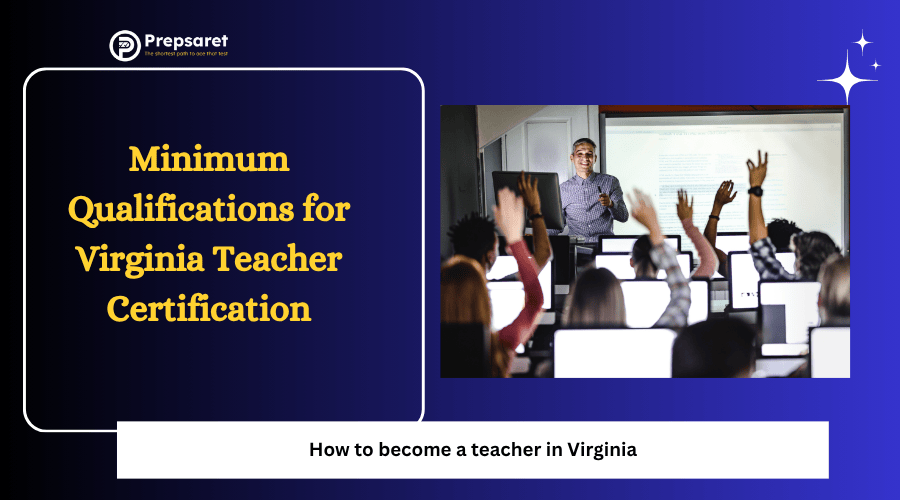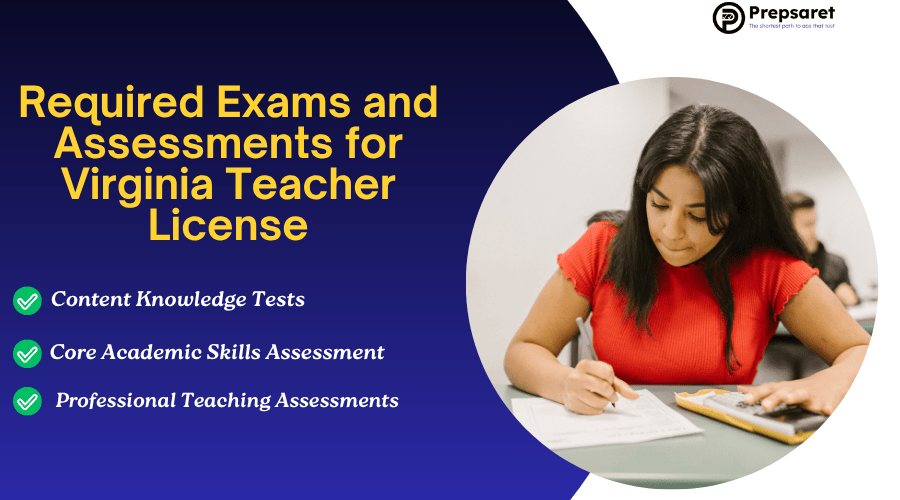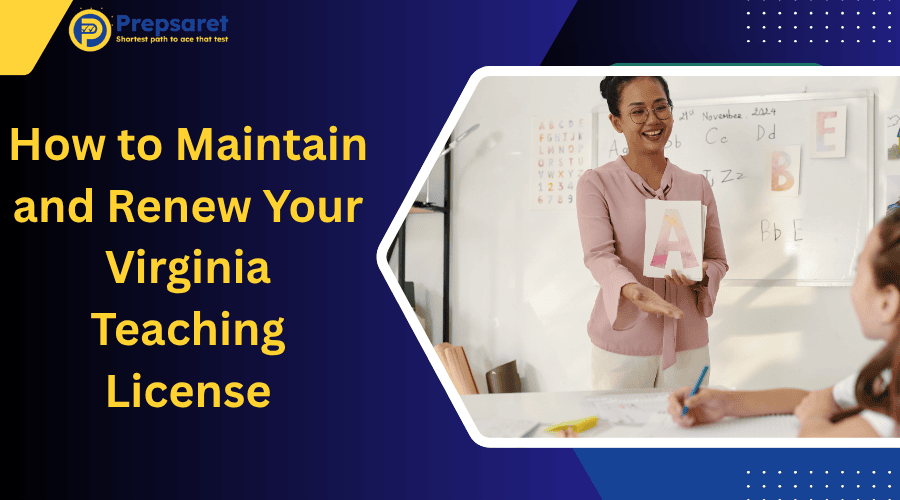Are you wondering how to become a teacher in Virginia? You’re embarking on a rewarding journey in a state known for its commitment to educational excellence. Virginia’s structured approach to teacher preparation ensures educators are well-equipped to inspire the next generation.
This comprehensive guide walks you through every essential step, from choosing your degree path to passing certification exams with confidence. With Prepsaret’s expert exam preparation resources, you’ll be ready to ace your licensure tests and launch your teaching career in the Commonwealth.
Virginia Education Landscape
The Virginia education system upholds high standards for all teaching professionals, managed by the Virginia Department of Education teacher licensure division. Educators can pursue careers in public vs private school teaching in Virginia, each with distinct requirements.
Public school teachers must hold valid teaching credentials in Virginia, complete state-approved programs, and meet ongoing continuing education requirements to maintain their licenses. Private schools, while not always requiring state certification, increasingly favor candidates with formal credentials for instructional quality.
Understanding these pathways helps you plan effectively. Those seeking public school roles, with state benefits and structured pay, must complete the full licensure process.
Minimum Qualifications for Virginia Teacher Certification
The Virginia teacher certification requirements establish that all prospective educators must earn at least a bachelor’s degree from an accredited college or university.
What Degree Do You Need to Teach in Virginia?
Your degree pathway depends on your career goals:
- Traditional Route: Complete a bachelor’s in education from a state-approved teacher preparation program. These Virginia teacher preparation programs combine coursework and field experience to develop classroom-ready skills.
- Content Specialization: Pursue a degree in a subject area such as math or English, then meet additional teacher education programs in Virginia requirements through a postgraduate certification track.
The state recognizes teaching degrees in Virginia from regionally accredited institutions that include supervised student teaching. Candidates who completed comparable programs out of state may also qualify through reciprocity.
Steps to Becoming a Teacher in Virginia
Ready to navigate the certification journey? Here’s your Virginia teacher licensure step-by-step guide through the educator licensure process:
Step 1: Complete Your Bachelor’s Degree
Enroll in an accredited four-year program. Whether you choose an education-specific degree or major in your teaching subject, ensure your program meets Virginia standards. Virginia teaching license requirements specify coursework in child development, instructional methods, and classroom management alongside your content area studies.
Step 2: Finish an Approved Teacher Preparation Program
Your teacher education programs in Virginia experience must include supervised clinical practice. Most programs require 150+ hours of classroom observation followed by a full-semester student teaching placement. During this time, you’ll develop lesson plans, assess student work, and manage classroom dynamics under licensed educator supervision.
Step 3: Pass Required Examinations
Virginia mandates specific assessments before licensure approval. You’ll need passing scores on content knowledge tests and professional teaching assessments. Prepsaret offers comprehensive Praxis preparation materials that mirror actual exam questions, giving you the confidence to succeed on test day.
Step 4: Submit Your Licensure Application
Complete your Virginia teaching license application through the Virginia Department of Education’s online portal. You’ll submit transcripts, exam scores, fingerprints for background screening, and application fees. Processing typically takes 4-6 weeks after submission of complete materials.
Step 5: Maintain Your Professional License
Once issued, your license requires renewal every five years through continuing education credits and ongoing background check for teachers compliance.
Following these structured steps ensures you meet every requirement for becoming a certified teacher in Virginia. Each phase builds on the previous one, creating a comprehensive preparation pathway.
How to Apply for Teacher Certification in Virginia
How to apply for teacher certification in Virginia involves submitting your application through the VDOE online portal, including transcripts, exam scores, background check results, and fees.
Required Exams and Assessments for Virginia Teacher License
Passing standardized assessments is a critical milestone when learning how to become a teacher in Virginia. The Commonwealth requires Virginia teacher exams and tests that evaluate both your content knowledge and pedagogical skills.
Core Academic Skills Assessment
Many programs require basic skills testing in reading, writing, and mathematics. The Praxis Core or Praxis II exams serve this purpose, though some candidates may substitute SAT/ACT scores if they meet minimum thresholds.
Content Knowledge Tests
You’ll demonstrate mastery in your intended teaching subject. Elementary education candidates take broad-based assessments covering multiple subjects, while secondary teachers take specialized content exams in their teacher endorsement areas, such as mathematics, English, science, or history.
Professional Teaching Assessments
Virginia also mandates pedagogy-focused exams that evaluate instructional planning, classroom management strategies, and assessment techniques. These tests ensure you understand teaching methodology beyond pure content knowledge.
How to Prepare for Praxis Exam With Prepsaret
Each exam has state-specific passing scores established by the Virginia Department of Education. To succeed, use Prepsaret’s targeted Praxis practice tools that mirror actual test formats.
Our resources offer realistic questions, detailed explanations, and performance analytics, helping you earn passing results and move confidently toward licensure.
Alternative Routes to Teacher Licensure in Virginia
Not every educator starts with a traditional teaching degree. The Commonwealth supports alternative pathways to teaching in Virginia, allowing professionals from other careers to transition smoothly into education.
Virginia Career Switcher Programs
If you’re wondering how to become a teacher in VA without an education degree, Virginia’s Career Switcher Programs offer a proven route. These accelerated options are designed for individuals with bachelor’s degrees in non-education fields.
Participants complete one year of pedagogy training while teaching under a provisional license and receiving classroom mentorship. Upon passing all required exams, they earn full credentials.
Teach For America Virginia
This competitive initiative supports alternative teacher certification in Virginia by placing high-achieving graduates in underserved schools. Members receive intensive training before beginning two years of classroom teaching while completing licensure requirements.
Post-Graduate Certificate Programs
Already hold a bachelor’s degree? Post-baccalaureate certificate programs offer the education coursework and student teaching experience needed for licensure, typically in 12–18 months, without requiring another full degree.
Military Experience and Troops to Teachers
Veterans can leverage their leadership and instructional experience through Virginia’s Troops to Teachers program, which provides tailored support for meeting certification standards.
These alternatives demonstrate that how to become a certified teacher in Virginia without a degree in education is entirely achievable. Each pathway maintains rigorous standards while recognizing diverse professional backgrounds.
How to Become a Teacher in Virginia Online
Balancing work, family, or other commitments? You can still pursue your teaching goals through online teacher certification programs in Virginia that provide flexibility without sacrificing quality. Several state-approved teacher preparation programs now offer fully online or hybrid options that include:
- Asynchronous coursework you complete on your schedule
- Virtual classroom observations and video-based teaching practice
- Regional clinical placements arranged near your location
- Online cohort communities for peer support
While student teaching must still occur in person, most coursework and assessments can be completed remotely, making online learning ideal for working adults, parents, or those in rural areas.
Benefits of Online Preparation Programs
Online pathways typically cost less than on-campus programs and allow you to maintain employment while completing requirements. They also enable candidates to meet Virginia teacher certification requirements through flexible, accredited coursework.
Preparing for Virginia Praxis Licensure Exams Online With Prepsaret
Alongside your coursework, quality Praxis exam prep is essential. Prepsaret provides expert support for Virginia teacher exams and tests, offering interactive practice questions, diagnostic assessments, and detailed study guides.
You’ll prepare efficiently with materials tailored to Virginia’s specific testing standards, maximizing your confidence and results.
Specialized Teaching Paths and Endorsement Areas in Virginia
Virginia recognizes that effective teaching requires specialized preparation based on student age groups and subject matter. Your teacher endorsement areas determine which grades and subjects you’re qualified to teach.
Elementary Education Endorsement (PreK-6)
If you’re exploring how to become an elementary school teacher in Virginia, you’ll complete comprehensive training in literacy, mathematics, science, and social studies. These programs emphasize child development, classroom management, and differentiated instruction to support diverse learners.
Elementary certification includes coursework in reading instruction, covering phonics, comprehension, and assessment, and requires passing subject-specific exams to demonstrate competency across multiple content areas.
Secondary Education Endorsement (6-12)
Secondary teachers focus on specialized subjects such as English, math, science, or social studies. Preparation programs strengthen both content mastery and understanding of adolescent development and subject-specific pedagogy.
Special Education Endorsement Programs
Special education endorsement programs provide advanced coursework in learning disabilities, behavioral interventions, inclusive education, and IEP development. This endorsement may be added to an existing license or pursued independently.
Other Endorsement Options in Virginia
Virginia offers additional endorsements in:
- English as a Second Language (ESL)
- Gifted education
- Reading specialist
- Library media
- School counseling (requires graduate degree)
Many teachers add endorsements throughout their careers, expanding their versatility and advancement opportunities.
How Long Does it Take to Become a Teacher in Virginia?
Typically, it takes about four years to earn a bachelor’s degree plus one semester of student teaching. Alternative certification programs can shorten this to 12–18 months after earning your degree.
Out-of-State Teachers and Reciprocity Options in Virginia
If you’re relocating to Virginia with an existing teaching license, the Commonwealth provides clear pathways through established Virginia teacher reciprocity agreements designed for experienced educators.
Can I Teach in Virginia With an Out-of-State License?
Yes, with some conditions, Virginia participates in the National Association of State Directors of Teacher Education and Certification (NASDTEC) Interstate Agreement. Teachers holding valid licenses from other states may qualify for Virginia licensure through reciprocity if they:
- Completed an approved teacher preparation program in their original state
- Hold a bachelor’s degree from an accredited institution
- Passed required examinations comparable to Virginia’s requirements
- Demonstrate three years of successful teaching experience
Additional Requirements for Out-of-State License Holders
Even with reciprocity, some applicants may need to:
- Submit official transcripts for credential evaluation
- Complete Virginia-specific coursework if endorsement areas differ
- Pass Virginia’s professional assessments when prior exams don’t align
- Undergo background checks and verify employment history
Provisional Licensing for Near-Qualified Applicants
If you nearly meet Virginia’s standards, you might receive a provisional license while completing remaining requirements. This allows you to begin teaching immediately while finalizing your credentials, typically within a one-to-three-year window.
The reciprocity process acknowledges your professional experience while ensuring all Virginia teachers meet consistent quality standards.
How to Maintain and Renew Your Virginia Teaching License
Earning your initial license is just the beginning. Virginia requires ongoing professional development to maintain teaching credentials in Virginia throughout your career.
License Renewal Cycles
Teaching license renewal occurs every five years. You must complete 180 professional development points (about 18 continuing education credits) within each renewal period. These can include:
- Graduate coursework or university extension classes
- Professional conferences and workshops
- Curriculum or instructional leadership projects
- Pursuit of National Board Certification
Continuing Education and Statutory Training Requirements
These requirements ensure educators stay updated on instructional practices, educational research, and classroom technology. Choose activities that align with your endorsement areas, such as:
- Online learning modules or peer mentoring
- School-division professional development sessions
Background Checks and Clearances
All educators must complete a background check for teachers, including fingerprint-based reviews through the Virginia State Police and FBI. These checks occur during initial licensure and periodically afterward.
Any new convictions must be reported to your employing division and the Virginia Department of Education.
License Status Verification
Track your license expiration date carefully. The Department of Education issues renewal reminders, but it’s your responsibility to complete requirements on time. Allowing your license to lapse can delay employment until renewal is approved.
Salary and Career Outlook for Virginia Teachers
Understanding compensation helps you make informed career decisions when pursuing teaching credentials in Virginia.
How Much Does a Teacher Make in Virginia?
Virginia teacher salaries vary by locality, experience, and education level. As of 2025:
- Starting teachers: $40,000-$52,000 annually
- Mid-career teachers (10-15 years): $55,000-$70,000
- Veteran teachers (20+ years): $65,000-$85,000+
Teachers in higher-cost regions such as Northern Virginia and Hampton Roads generally earn more than those in rural divisions. Educators with master’s degrees or National Board Certification receive additional stipends.
Benefits Package for Virginia Educators
Beyond base salary, Virginia teachers receive:
- Health insurance (often with employer contributions)
- Virginia Retirement System pension benefits
- Paid sick and personal leave
- Professional development funding
- Summer months off (though many teachers pursue summer employment)
Public vs. Private School Teacher Compensation in Virginia
When comparing public vs private school teaching in Virginia, compensation structures differ significantly. Public schools offer standardized pay scales, state benefits, and job security. Private institutions vary, some elite schools match or exceed public salaries, while others trade lower pay for smaller classes and greater curricular flexibility.
Career Advancement Opportunities for Virginia Teachers
Teaching in Virginia provides room for professional growth, including:
- Department chair or instructional coach roles
- Administrative positions (assistant principal, principal)
- Division-level curriculum leadership
- University-level teaching in Virginia teacher preparation programs
Job Market Outlook and Teacher Demand in Virginia
Virginia faces teacher shortages in specific areas, particularly:
- Special education
- Mathematics and sciences
- World languages
- Career and technical education
These high-need fields often come with signing bonuses, loan forgiveness programs, and accelerated advancement opportunities. Elementary education and English positions face more competition but still offer stable employment prospects.
Try this out: Praxis Core Reading (5713) Free Questions
How to Become a Teacher in Virginia: FAQs
What Is a Teacher's Salary in Virginia?
Virginia teacher salaries range from $40,000 to $85,000 annually, depending on location, experience, and education level, with higher pay in urban regions.
Is There a 2-Year Teaching Degree?
No, Virginia requires at least a bachelor’s degree for teacher licensure. However, associate degrees can lead to future education program transfers.
How Quickly Can I Get a Teaching Certificate?
Through alternative programs, you can earn a provisional teaching certificate in about 12–18 months while completing classroom training and exams.
How Do I Become a Teacher in Virginia Without a Teaching Degree?
Join Virginia’s Career Switcher Programs or post-graduate certification routes, designed for professionals with non-education bachelor’s degrees seeking full teacher licensure.
What Is the Fastest Way to Become a Teacher?
The fastest path is an approved alternative certification program, letting you teach under a provisional license while finishing coursework and required exams.
Conclusion: Your Journey to Becoming a Virginia Educator
You now understand exactly how to become a teacher in Virginia, from choosing your preparation pathway through maintaining your professional license. The Commonwealth offers multiple routes to certification, welcoming both traditional education majors and career changers into the profession.
Whether you pursue becoming a certified teacher in Virginia through university programs, online options, or alternative pathways, rigorous preparation ensures success.
Take your certification exams with confidence by preparing with Prepsaret, the trusted platform delivering exact practice questions and comprehensive study materials for Virginia’s licensure tests. Your teaching career starts now!




